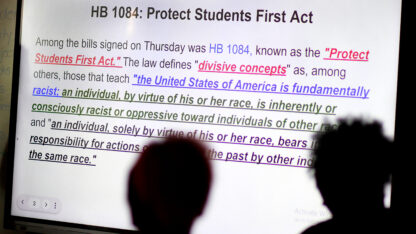Georgia is refusing to provide state funding for the new Advanced Placement course in African American Studies, so some school districts have cancelled plans to teach the course to high schoolers.
Advocates complain that the decision by Georgia’s elected school superintendent will suppress teaching about Black history, just like officials did in Florida, Arkansas and some other places.
“The fact that AP African American studies was removed from our schools is alarming and an injustice to our students who eagerly anticipated taking this course,” state Rep. Jasmine Clark, a Democrat from Lilburn, said in a statement. “Erasure of black history from our schools is not and never will be okay!”
The State Board of Education, appointed by the governor, must approve a class for it to be eligible for state funding, which helps pay for a teacher’s salary and class materials. Superintendent Richard Woods decided he won’t recommend approval of the class to the board, but didn’t say why.
“Superintendent Woods has opted not to recommend this course for state approval at this time,” Meghan Frick, a spokesperson for the state Department of Education, wrote in an emailed statement.
Local districts can still pay for the AP course out of their own funds, Frick said. The state isn’t denying credit toward high school graduation if they do. Frick also noted that Georgia funds a state-designed African American Studies course approved in 2020. That course doesn’t qualify for AP credit.
The AP course drew national scrutiny in 2023 when Florida’s Republican Gov. Ron DeSantis, preparing for his presidential run, said he would ban the course in his state because it pushed a political agenda.
In Arkansas, state officials have said the course will count for credit in the coming school year. They denied such credit last year, saying it wasn’t yet clear that the AP course would comply with a state law restricting how race can be taught. Six schools taught the pilot course anyway.
Some individual school districts around the country have also declined to offer the course.
As conservative criticism mounted, The College Board removed several topics from the exam, including Black Lives Matter, slavery reparations and queer life, and was criticized for bowing to political pressure.
A later set of changes includes more material on topics including the Tulsa Race Massacre; Black culture’s influence on film and sports; and discriminatory practices related to housing, known as redlining. This framework is being used as the course officially launches in the school year that’s about to begin.
The College Board, a nonprofit testing entity, offers AP courses across the academic spectrum, including in math, science, social studies, foreign languages and fine arts. The courses are optional and taught at a college level. Students who score well on a final exam can usually earn college credit.
There has been little public discussion in Georgia of the African American Studies course. But in 2022, Georgia lawmakers passed a ban on teaching divisive racial concepts in schools, prohibiting claims that the U.S. is “fundamentally or systematically racist,” or that any people are “inherently racist or oppressive, whether consciously or unconsciously.” No one “should feel discomfort, guilt, anguish, or any other form of psychological distress because of his or her race,” says this measure, which was based on a now-repealed executive order from President Donald Trump that was hotly opposed by Democrats and liberal groups.
Sara Sympson, a spokesperson for the College Board, said 33 Georgia schools piloted the course in 2023-2024. Some of those schools assumed they would be offering the finalized version of the course this year.
Georgia’s refusal to approve the course came to light Monday when the state’s largest school district, Gwinnett County in suburban Atlanta, issued a memo saying it was scrapping plans to teach the course at six high schools. Schedules for 240 students will have to change before classes begin on Aug. 5.
“We are committed to offering a comprehensive and inclusive education for each and every student,” Gwinnett County superintendent Calvin Watts said in a statement. “The 2023-24 AP African American Studies pilot was successful, and we are disappointed that students will neither have the opportunity to take, nor to receive credit for this innovative college-level course.”
In DeKalb County, another Atlanta suburb, rising senior Daniel Herrera was among the students pushing for the AP class to be offered at Dunwoody High School. He blamed the cancellation on a “conservatively dominated” Georgia Department of Education.
“I think it’s essential for students to remember everybody’s history equally,” Herrera said.
Angela Williams-Pitkonen, who would have taught the class at Dunwoody, said 100 students had signed up, as many as typically sign up for AP World History.
“There’s no reason to not offer this class,” Pitkonen said. “This class is not a class that’s designed to make white students feel guilty; it’s not a class designed to make Black students feel ashamed.” Instead, she argued that it would teach understanding and empathy.
“I think the old guard may be uncomfortable with the level of empathy they are seeing in their children and their grandchildren,” Pitkonen said.










